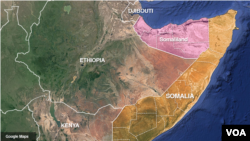The director of a hospital in Las Anod, a disputed border town in Somalia's breakaway region of Somaliland, says about 200 people have been killed and hundreds more wounded in weeks of intense fighting.
For about a month now, the Somaliland army has been fighting with clan militias for control of Las Anod. Somaliland, which broke away from Somalia three decades ago, has controlled the town since 2008, but the local clans support Somalia's federal government and wish to be governed by it.
Despite local and international calls for a cease-fire, fighting has continued, raising fears of a full-blown humanitarian crisis amid a biting drought that has already affected thousands of people in the contested region.
Dr. Ismail Mohamoud, director of Gargaar Hospital in Las Anod, said the number of wounded patients is close to 1,000, while more than 200 people have been killed in the fighting. Most of the victims are civilians, he added.
Mohamoud said the situation in the city has gotten worse due to the shelling of hospitals. The main Las Anod Hospital has suffered the most with virtually all the departments destroyed by shelling from Somaliland forces, he said.
The U.N. Security Council last month called for a de-escalation of violence in Las Anod, adding to similar calls from the federal government in Mogadishu. Those calls have gone unheeded as both sides continued exchanging heavy fire.
Matt Bryden, founder of Sahan Research, a security and political think tank focusing on the Horn of Africa, told VOA why peace remains elusive in Las Anod.
"At this moment, there appears to be little possibility of an imminent resolution of the conflict," he said. "The multiplicity of actors and interests makes it extremely difficult to find a middle ground."
He said Somaliland will not easily relinquish its claim to the Sool region, in which Las Anod is located, because that would undermine the territory's push to be recognized as an independent country.
According to Bryden, a military victory for either side may pave the way for dialogue. He said demands by the Dhulbahante clan in Las Anod for their own regional government could upset the federal structure in Somalia. He said this could motivate other clans which may not be happy with their respective regional governments to follow suit.
"The first victim of this conflict is probably Somaliland's electoral calendar. It's hard to see how party and presidential elections could take place this year if much of Sool region is excluded from voting," Bryden said. "And this in turn would have wider ramifications for Somaliland's claim to be an electoral democracy, which has already taken a beating due to widespread criticism of its actions in Las Anod."
Ahmed Hadi, founder of a Mogadishu-based governance think tank, told VOA the competing interests between Somaliland, Somalia's semi-autonomous Puntland region and the clans within the Sool region mean the fighting could continue for a long time.
The main challenges are linked ones, he said, as Puntland state wants to dislodge Somaliland from the territories while Somaliland wants to control these areas to tell the world it is ready for recognition. Also, clans in this area are struggling for independence from both sides.
Hadi said the fighting and the casualties among civilians will hurt Somaliland's reputation and complicate its long-standing push for international recognition.




